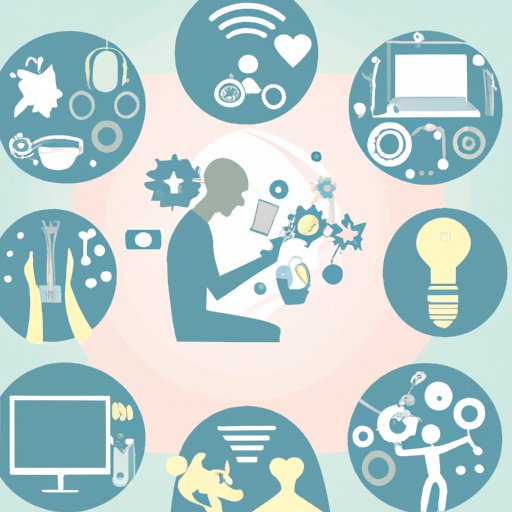Introduction
Technology has become an integral part of our daily lives. From smartphones to computers, we rely on various forms of technology to help us stay connected, informed, and productive. But what are the long-term effects of this increased reliance on technology? In this article, we will explore some of the potential pros and cons of technology to better understand its impact on us.

Impact of Technology on Social Lives
One of the most profound changes that technology has had on our social lives is the way in which we communicate. According to a study by the Pew Research Center, 92% of Americans now own a smartphone, and 81% use social media platforms like Facebook, Twitter, and Instagram to stay connected with friends and family.
The prevalence of social media has drastically changed the way we interact with each other. For example, nearly two-thirds of American adults say they have used social media to connect with someone they hadn’t seen or heard from in a while. This new form of communication allows us to keep in touch with people who may be far away and maintain relationships with those we wouldn’t otherwise be able to.
However, there are also potential downsides to relying too heavily on technology for social interaction. A study by the University of Pittsburgh found that heavy use of social media was linked to feelings of loneliness and depression. The researchers concluded that “the more time young adults use social media, the more likely they are to be unhappy.”

Changes in Work and Learning
Technology has also had a major impact on the way we work and learn. Thanks to advances in technology, it’s now possible to work remotely from anywhere in the world. This has opened up a wealth of opportunities for people who want to work flexibly or find freelance work. Additionally, many companies are now using automation to streamline their processes, resulting in increased efficiency and cost savings.
In terms of learning, technology has revolutionized the way students access information. Online courses and digital textbooks make it easier than ever for students to acquire knowledge and skills. Furthermore, the availability of online tutoring services has made it possible for students to get personalized help when needed.
Health Risks Associated with Technology
While technology can be incredibly useful, extended use of screens can have a negative effect on our health. According to the American Optometric Association, extended use of digital devices can lead to digital eye strain, which can cause headaches, blurred vision, dry eyes, and neck and shoulder pain.
Additionally, increased use of technology has been linked to a rise in obesity rates. Technology can make it easier to lead a sedentary lifestyle, which can lead to weight gain and an increased risk of chronic diseases like diabetes and heart disease.
Environmental Effects of Increased Technology Use
The increased use of technology has also had an impact on the environment. Data centers, which store and process data, require a large amount of energy and generate a significant amount of heat. If not properly managed, these data centers can contribute to air and water pollution.
In addition, the manufacturing of technology products often relies on toxic materials, such as mercury and lead, which can be released into the environment if not disposed of properly. As technology becomes more prevalent, these environmental issues will need to be addressed.
Economic Implications of Technology
The cost of purchasing and maintaining technology can be a burden for some individuals and businesses. While technology can help increase efficiency and productivity, it can also be expensive to install and maintain. Companies must also consider the cost of training employees to use new technologies.
Furthermore, technology can have an effect on wages. Automation of certain jobs can reduce the need for human labor, leading to fewer job opportunities and lower wages for those who do find employment.

Ethical Considerations of Technological Advancement
Finally, there are ethical considerations associated with the advancement of technology. One of the biggest concerns is related to privacy. With the increasing prevalence of data collection and analysis, there is the potential for misuse of personal information.
Additionally, technology has the potential to be used for malicious purposes. For example, hackers can use technology to steal confidential information or disrupt systems. It is important to consider the potential risks associated with technological advancements and ensure proper safeguards are in place.
Conclusion
Overall, technology can be both beneficial and detrimental to us. On one hand, technology has improved our ability to communicate, work, learn, and access information. However, it can also have negative effects on our health, environment, economy, and ethics. As technology continues to evolve, it is important to consider all of the potential implications of its use.
(Note: Is this article not meeting your expectations? Do you have knowledge or insights to share? Unlock new opportunities and expand your reach by joining our authors team. Click Registration to join us and share your expertise with our readers.)
